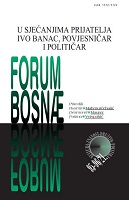A FOUCAULDIAN ANALYSIS OF THE DAYTON ACCORDS: IVO BANAC AGAINST BOSNIA’S ENEMIES
A FOUCAULDIAN ANALYSIS OF THE DAYTON ACCORDS: IVO BANAC AGAINST BOSNIA’S ENEMIES
Author(s): Keith DoubtSubject(s): International relations/trade, Transformation Period (1990 - 2010), Political Essay, Peace and Conflict Studies, Wars in Jugoslavia
Published by: Međunarodni forum Bosna
Keywords: Yugoslavia; Bosnia; BiH; Dayton Accords;
Summary/Abstract: This essay employs the work of Michel Foucault to critique the Dayton Accords. The manifest function of the Dayton Accords was to stop the sociocidal war in Bosnia-Herzegovina. The Dayton Accords froze the war. During the drafting of the Dayton Accords, emergency measures regarding the inflated rights of three ethnic groups as constituent peoples were taken. Their latent function has been to leave the country politically stagnant and the latent function has supplanted the manifest one. The Dayton Accords empower the ethnopoliticians to continue their sociocidal actions against the country. The unanticipated (and, for some, the intended) consequence of the Dayton Accords could be the death of Bosnia-Herzegovina as a unitary country (Mahmutćejajić 2000; 2003).
Journal: Forum Bosnae
- Issue Year: 2021
- Issue No: 95-96
- Page Range: 107-116
- Page Count: 10
- Language: English
- Content File-PDF

